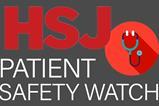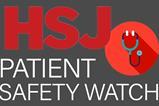HSJ is now hosting the Patient Safety Watch newsletter, written by Patient Safety Watch chief executive James Titcombe.
Good afternoon and welcome to this edition of the Patient Safety Watch newsletter.
It’s been another busy period for patient safety news, so let’s get stuck in.
Sacked for speaking up about unsafe maternity care
I’ve been saddened and concerned in recent months following the case of Martyn Pitman.
Mr Pitman, by so many accounts, is a well-respected obstetrician and gynaecologist. However, he recently lost his job of more than 20 years as a consultant at Royal Hampshire County Hospital in Winchester after his bosses cited an “irretrievable breakdown in his relationship with management”.
Speaking to The Times, Mr Pitman described how his ordeal began four years ago when he warned hospital managers about “dangerously low staffing levels” and raised concerns women were “being pressured into having natural births over caesarean sections”. He said: “I was trying to take a stand against normal birth ideology. That was met with, at times, fierce resistance and criticism, locally and regionally.”
The Times reports that Mr Pitman first raised concerns in May 2019, but was told members of the senior midwifery management team had complained about him, marking the beginning of a four-year “witch-hunt”.
The case has sparked outrage among many of the women and families to who Mr Pitman has provided care, with a Facebook group with more than 1,200 members set up by supporters, many of whom have shared remarkable stories of lives saved and compassionate, high-quality care.
The story has a strong personal resonance with me, as I’ve also experienced a harmful backlash for speaking out about the dangers of “normal birth ideology”, including quite targeted “complaints” made to organisations I work with.
My feeling is that this case has some far-reaching implications and lessons, at a national as well as local level. Time will tell – but in the meantime, there can be little disagreement that losing a dedicated professional so clearly valued by many hundreds of women and families is a tragic loss to the NHS.
Fear and futility surrounds confidence to speak up
Earlier this month, the National Guardian’s Office published its analysis of the questions relating to speaking up in the 2022 NHS Staff Survey, finding the “Freedom to Speak Up subscore” declined from 6.5 in 2021 to 6.4 in the most recent survey.
The report – sombrely titled Fear and Futility – found declines “in all measures relating to speaking up, both relating to raising concerns about clinical safety and speaking up more generally”.
Jayne Chidgey-Clark, national guardian for the NHS, said it was “not acceptable” two-fifths of NHS workers felt unable to speak up about anything concerning them, adding: “These survey responses show us that there is a growing feeling that speaking up in the NHS is futile – that nothing changes as a result… this urgently needs to be addressed.
“Failing to do so risks compounding this sense that workers do not have the resources they need to deliver the high-quality care they want for their patients. This will have a direct impact on patient safety.”
Dozens of patients die after feeding tube ‘never events’
An investigation by the MailOnline has uncovered 145 incidents of feeding tubes (nasogastric tubes) being misplaced in airways over the last five years, of which 28 involved a patient death. This type of accident is classified as a “never event”, meaning it should be totally avoidable if proper protocol is followed. Feeding tubes are used for patients who have problems swallowing, which can happen following a stroke, for example.
Those reading with clinical or patient safety roles in an acute setting may well be aware that the issue of nasogastric tube misplacement is a patient safety problem with a very long history, subject to multiple national patient safety alerts and guidance stretching back over a decade, as well as being the subject of a national Healthcare Safety Investigation Branch investigation in 2020.
The publication’s reference to “bungling hospital staff”, however, perpetuates the unhelpful (and untrue) narrative that patient safety problems like this can be put down to individual “mistakes”. A deeper understanding of safety science suggests the solution has to go beyond the “person” (eg training and guidelines) and involve a more holistic, system-focused approach, looking at aspects such as innovation in equipment and technology.
I’ve no doubt it’s a problem safety scientists/human factors specialists will be working on to find a solution to – the fact this problem continues despite so many alerts, recommendations and guidance shows further work and a different approach is badly needed.
In other news this edition:
Overwhelming majority of negligence claims for maternity
The Daily Mail has revealed that of the 364 medical negligence claims made against the health service last year, more than three-quarters were related to maternity.
The publication pointed out that the figures come as midwife numbers in the NHS have fallen, with 4,522 fewer midwives than a decade ago. Action Against Medical Negligence’s Peter Walsh described maternity services as being in a “very dire state”, while Birth Trauma Association chief executive Kim Thomas added: “There isn’t a culture of safety in some places.”
Emergency department deaths soared during winter crisis
An investigation by the Mirror has discovered deaths in accident and emergency departments shot up last December, as the NHS tackled one of its most difficult winters. Data obtained from 84 trusts revealed 2,242 people died in emergency departments during December 2022, compared with a monthly average of 972 deaths in A&Es since 2018.
The newspaper pointed out that, during the same month, just 65 per cent of patients were seen within four hours of arriving at A&E, compared with a target of 95 per cent, while 12-hour waits for admissions also rose sharply.
Warnings raised staff shortages compromising safe cancer care
A pair of reports by the Royal College of Radiologists have warned a lack of staff is leading to delays in cancer care, with the reports revealing virtually all (97 per cent) cancer centres in the UK have experienced delays in patients’ treatment due to staff shortages. About a quarter of centres said they faced delays on a weekly basis due to shortages. The reports also warned that more than three-quarters of the clinical oncologists and radiologists who left the NHS in 2022 were under 60.
RCR president Katharine Halliday said: “All doctors want to give patients the best possible care, but workforce shortages are hampering our ability to do that. There are simply not enough doctors to safely treat the volume of patients needed, and this will only worsen as demand rises and more doctors leave the NHS.
“We face moral injury from dealing with the impossible balancing act of an overstretched service, burned out staff and ever-rising demand for care.”
Sharing some good stuff…
HSIB Safety Investigations Conference 2023
Registration is now open to attend the Healthcare Safety Investigation Branch’s next Safety Investigations Conference on Wednesday 27 September. It’s free, it’s virtual, and it’s CPD accredited.
The conference ties in with the World Health Organization’s World Patient Safety Day theme and includes a focus on patient and family engagement.
Other agenda items include:
- HSIB national investigations – what HSIB has learnt and how it can help support and improve local investigation practice;
- HSIB’s maternity investigation programme – working with families and trusts on how HSIB implements learning and influences change;
- Safety management systems;
- How HSIB’s education programme is sharing learning to develop and improve local safety investigations;
- An overview of HSIB’s international work; and
- Breakout sessions to share knowledge.
Previous HSIB conferences have been superb and hugely informative, so I can highly recommend signing up.
AHSN Network publishes quality improvement resource pack
The AHSN Network has expertise in supporting quality improvement projects using methodology from the Institute of Healthcare Improvement model and has published a resource pack providing an overview of the different ways Patient Safety Collaboratives can support local safety improvement projects. The resource pack is available here.
Maternity insights: closing the loop, learning from harm
NHS Resolution has published a new e-learning module designed to be a valuable tool to aid clinical decision-making. Created by clinicians for clinicians and in collaboration with Staffordshire University, London South Bank University, and Capsticks Solicitors LLP, the module also supports learners to understand NHS Resolution’s early notification scheme. The module is available here.
That’s all for this edition. Please look out for the next newsletter on 7 July. Thanks for reading and stay safe.
James Titcombe































1 Readers' comment